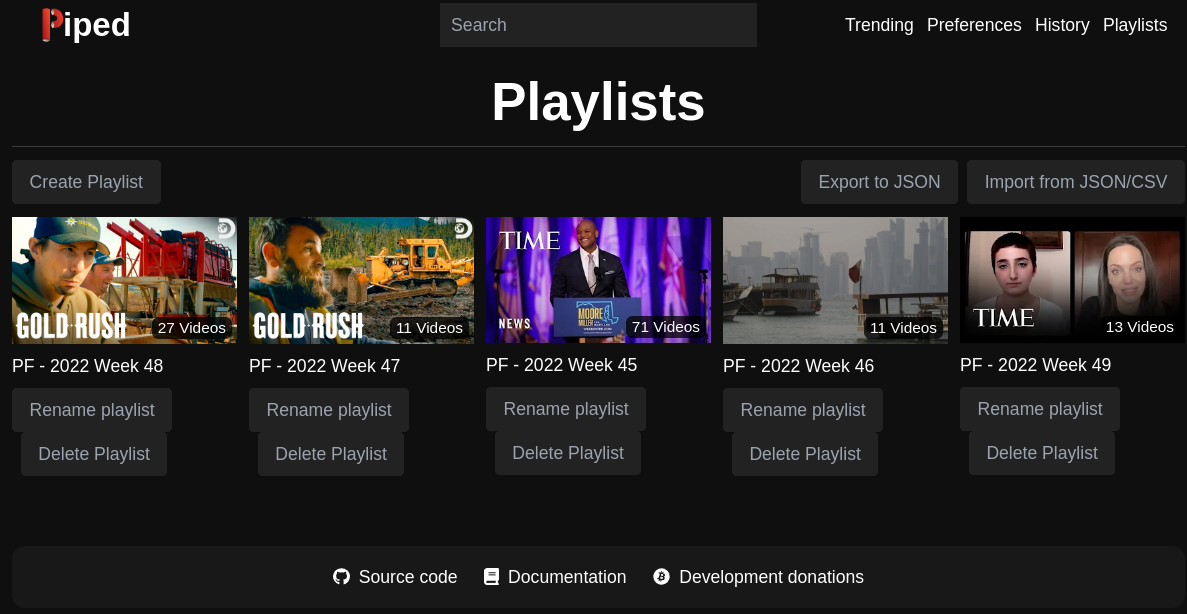Tool for Piped and written in Go (Golang).
Keep your feeds clear by creating and keeping up-to-date weekly/monthly playlists, based on your subscriptions.
The Synchronization feature offers an alternative to the Feed section by organizing the playlists in a structured way, still using the subscribed channels.
Basically, you decide:
- the creation strategy: one playlist by month or by week.
- the start date: most of the time you will pick the current date when using piped-playfeed for the first time. All channels videos after this date will be handled by piped-playfeed.
Thanks to the playlists, you can remove videos you saw (or the ones that don't interest you) in order to only keep the videos to watch (that's the initial need that did motive me to develop this tool).
Other benefit: thanks to its mechanical, piped-playfeed is not impacted by the common mismatch issue (see #1130) between the channel videos and the content of the Feed section.
Note: piped-playfeed uses a local Sqlite database in order to avoid to perform too many requests when communicating with the Piped API.
Indeed, when piped-playfeed discovers the new available videos, it memorizes the date of the last video encountered for each channel.
Thus, at the next run, piped-playfeed will stop to request channel videos once he will meet the last video seen during the previous run.
==> it can be seen as a backup of your playlists feeds, but also as a kind of respect to the bandwidth of the hosted Piped instances shared by courtesy.
Releases contain prebuilt binaries for Linux, macOS and Windows. You can download them at https://github.com/frajibe/piped-playfeed/releases.
git clone https://github.com/frajibe/piped-playfeed.git
cd piped-playfeed
go buildFirst of all, create the following configuration file by copying the template piped-playfeed-conf.json from the sources.
See below for the details of the configuration.
| Attribute | Description | Mandatory | Default |
|---|---|---|---|
instance |
Url to the Piped instance API | YES | |
account |
Credentials for the Piped instance | YES | |
database |
Path to the local Sqlite database | no | piped-playfeed.db |
| Attribute | Description | Mandatory | Default |
|---|---|---|---|
playlistPrefix |
Prefix to apply on the managed playlists | no | PF - |
strategy |
Playlist creation strategy among month and week |
no | month |
type |
Type among duration and date |
no | duration |
duration/unit |
If type=duration. Duration unit among month and day |
no | month |
duration/value |
If type=duration. Positive integer matching the duration unit |
no | 1 |
date |
If type=date. Format must be YYYY-MM-dd.Videos before this date won't be indexed. |
no | 1 month ago |
See the available arguments:
$ ./piped-playfeed --help
Usage of ./piped-playfeed:
-conf string
Provide the path to the configuration file (default "piped-playfeed-conf.json")
-debug
Enable debug logging
-help
Show help
-log string
Provide the path to the output log file (default "piped-playfeed-log.json")
-silent
Hide progress in console
-sync
Action: synchronize the playlists accordingly to the subscriptions
-version
Show versionCreate monthly playlists based on the subscriptions since one month ago.
- Configuration
piped-playfeed-conf.json
{
"instance": "...",
"account": {
"username": "...",
"password": "..."
},
"synchronization": {
"strategy": "month",
"type": "duration",
"duration": {
"unit": "month",
"value": 1
}
}
}- Commandline
$ ./piped-playfeed --syncCreate weekly playlists based on the subscriptions since 2022-12-01.
The Sqlite database is located at /opt/pf/piped-playfeed.db and the configuration file is located at /opt/pf/piped-playfeed-conf.json.
- Configuration
piped-playfeed-conf.json
{
"instance": "...",
"account": {
"username": "...",
"password": "..."
},
"database": "/opt/pf/piped-playfeed.db",
"synchronization": {
"strategy": "week",
"type": "date",
"date": "2022-12-01"
}
}- Commandline
$ ./piped-playfeed --conf /opt/pf/piped-playfeed-conf.json --syncIn order to keep your playlists up-to-date with your feed, think about periodically running piped-playfeed.
It's up to you to decide this frequency depending on how often you visit Piped.
There are multiple solutions to periodically run an application, here are some examples:
-
Linux & Cron
Edit your own crontab file:
$ crontable -e
And then append this line to run the app every 3 hours. Feel free to adapt the periodicity, you can use this generator.
0 */3 * * * bash -c '/home/me/piped-playfeed --conf /home/me/playfeed-conf.json --sync --silent'Every day at 4pm:
0 16 * * * bash -c '/home/me/piped-playfeed --conf /home/me/playfeed-conf.json --sync --silent'
A lock file is created at the startup of the application, and automatically removed once stopped. It actually prevents multiple instances from being running, for the sake of the synchronization process.
If this file is not removed, check the content of the log file in order to find out the reason, and finally remove the lock file. If you think you're facing to a bug, please open a ticket on GitHub.


